Rank on Google's first page in 3 months
10 Must-Try SEO Strategies for Small Business Success
May 24, 2024 | Athira K
It doesn’t matter how big or small your business is; attracting customers to your website is a universal goal. This can only be done effectively if you implement the correct SEO strategies. The best way to improve your SEO if you’re a small business is to adopt small SEO strategies.
Here, we’ll explore the best small business SEO strategies that can make your site more visible and drive more traffic. Following SEO in your small business will help your business stand out.
What Is Small Business SEO?
If you have a small business and want to improve your SEO, that’s called small business SEO. You can strategize your site and online presence to increase traffic from search engines. You can easily bring the right people to your website, including potential clients, customers, and leads, with small business SEO. Small business seo strategies are a subset of general seo strategies.
There are some key takeaways in your small business seo,
- SEO helps you in your small business SEO, which helps attract organic web traffic to drive more visitors and potential customers.
- Google Analytics, Google Search Console, Google Keyword Planner, and Google My Business are the best tools that can help your small business SEO.
- You can get help with affordable SEO tools to set up your keyword research to help improve your online content.
- Local SEO tools and strategies also help improve small businesses’ online presence.
10 SEO Strategies For Small Business
Here are 10 small business SEO strategies to boost your online presence and get more traffic. Let’s see how these small business SEO strategies can help.
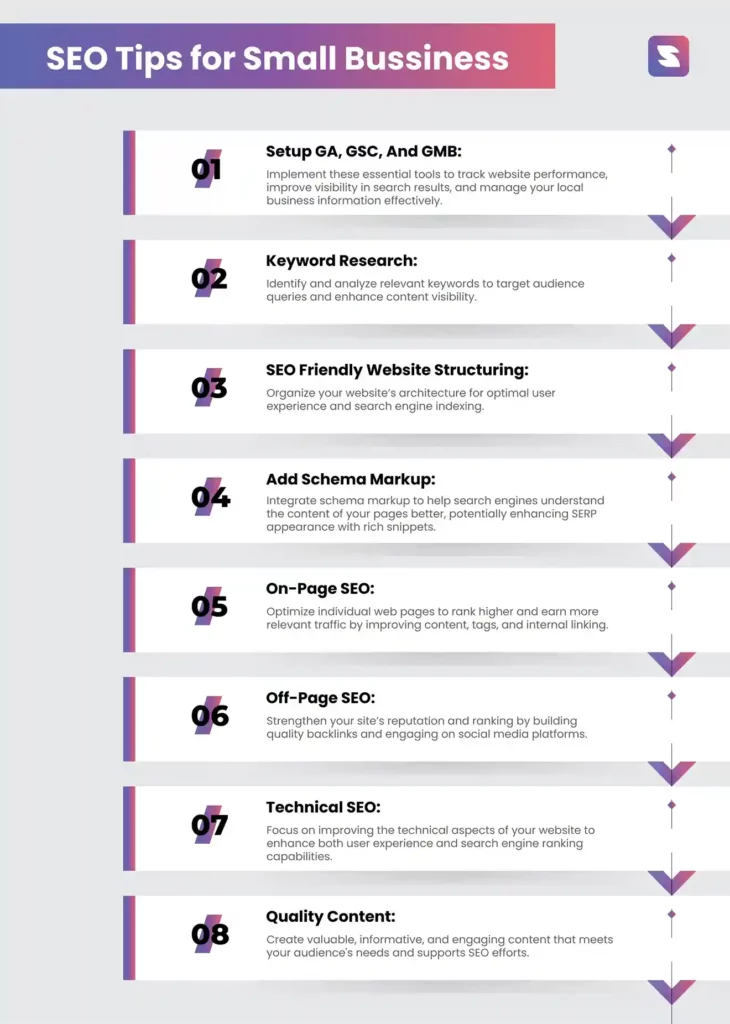
Setup Google Analytics, Google Search Console, And Google My Business Profile
You can set up Google Analytics (GA), Google Search Console(GSC), and Google Business Profile (GMB) for your business. These are the fundamental parts of a business SEO. These tools will help you track seo efforts and monitor your progress.
If you are the one who is starting your seo or trying to enhance the current seo strategies, you need these tools to understand the metrics. These tools are free, so you don’t have to spend any money.

Google Analytics (GA) is used to understand how your visitors interact with your site. It can help you with so many features on your website, like,
- GA shows where your visitors are coming from. This can be anywhere, such as search engines, direct visits, referrals, or social media.
- It shows you the metrics of how your visitors interact with your site. This includes the pages they visit, how long they stay on the website, and what actions they take.
- The tool helps you set goals to track your website conversions. It includes form submission and product or service purchasing.
Create a Google Analytics account
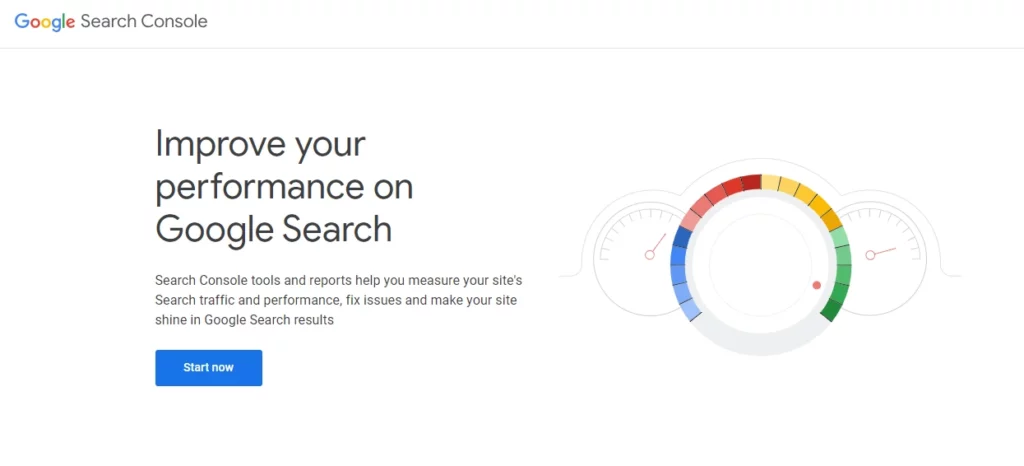
Google Search Console offers you the ability to measure your site’s search traffic and performance, fix issues, and make your website the best in search engine results.
- This gives you data on how often your website appears on Google search, how often searchers click through for those queries, and more.
- You will get all the issues that could affect your website’s performance in search engines.
- You can easily submit sitemaps and individual URLs to Google Search Console, which will help you better understand your site’s structure.
Create a Google Search Console Account
- Step 1: Sign into the Google Search Console
- Step 2: Add Your Website
- Step 3: Verify ownership
- Step 4: Configure settings
- Step 5: Monitor and Optimize
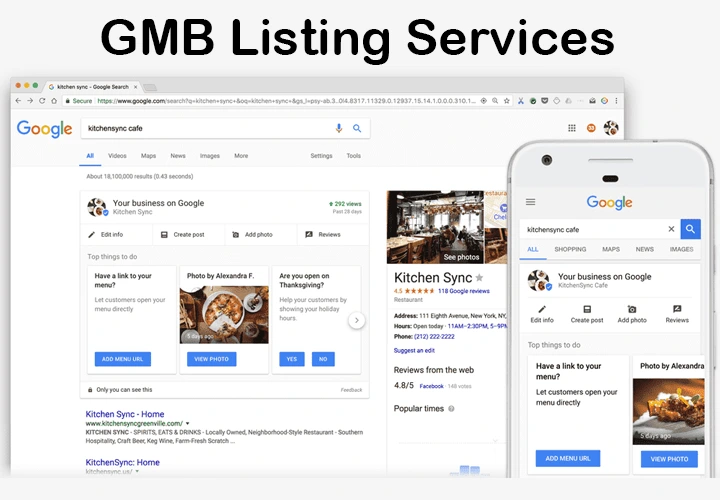
Google My Business is a very popular tool for local businesses. It helps your business website appear in local search results and Google Maps.
- You can easily create a GMB profile, which will increase your chances of appearing in local seo results on Google Maps.
- This tool allows you to provide potential customers with up-to-date information about your business.
- Your customers can easily put reviews, ask questions, and interact with your content.
Create a Google My Business Account
- Step 1: Sign in to Google My Business
- Step 2: Add Your Business
- Step 3: Enter Business Details
- Step 4: Verify Your Business
- Step 5: Customize Your Profile
- Step 6: Manage Your Profile
2. Keyword Research
Find the right targeted keywords for your business with a proper keyword research strategy. You can use these keywords on your website in the content, titles on your pages, and even on your URLs. In seo, it’s all about optimizing for keywords so that your website contains them for a proper online presence for your business.
You can use a keyword research tool to analyze and research apt keywords properly. It helps you research, identify, and target keywords that are relevant to your small business strategy.
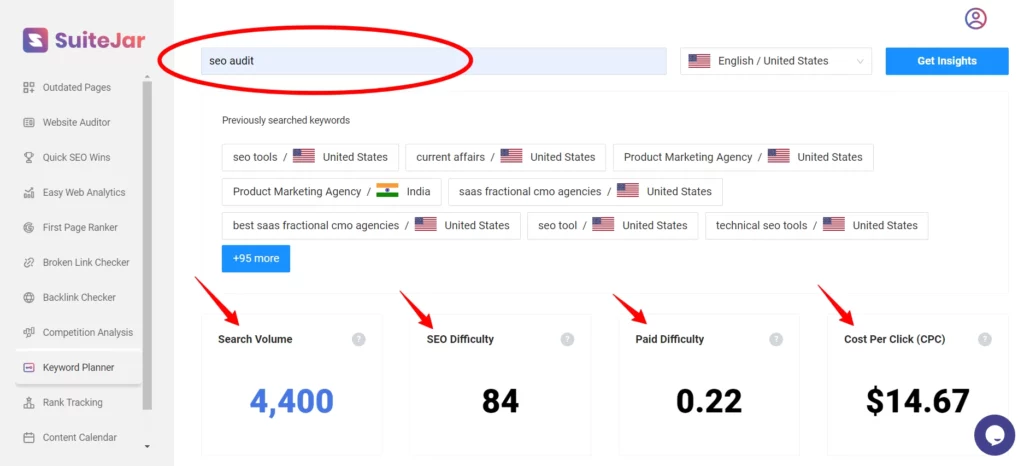
You can analyze your competitor’s keywords, and that can also add to your keyword research strategy. Remember these points in your keyword research:
- Listen to your customers to find keywords
- Incorporate long-tail keywords
- Use location-based keywords
- Check your website searches
- Use apt keyword tools
Further Reading: The Essentials of Keyword Mapping for SEO Success
3. SEO-Friendly Website Structuring
Structuring your website in an SEO-friendly way helps search engines better understand it and index your website’s content. A perfect site structure also improves user experience and makes navigation easier.
- Design a clear, logical site hierarchy and navigation menu.
- Use SEO-friendly URLs that include keywords and are easy to understand.
- Implementing breadcrumb navigation will help users and search engines navigate your site.
- Ensure your website has a sitemap file to help search engines better crawl your site.
- Regularly audit your site structure to ensure it remains efficient and effective.
Further Reading: Building SEO-Friendly Websites with Essential Tips
4. Add Schema Markup
You can improve the positioning of your website in search engine results (SERPs) by adding schema markup to the HTML of your web pages. By adding this, search engines can parse and analyze the information on your pages more effectively.
This will display rich snippets like stars for ratings, prices for products, or author photos for articles directly in the search results. It helps lead to higher click-through rates, as it provides key information at a glance.
Further Reading: What is Schema Markup? How Does It Help with SEO?
5. On-Page SEO
On-page seo is very important in search engine optimization. This helps small businesses in improving online presence and attract targeted traffic to their websites. Optimize elements like meta titles, descriptions, and headers with relevant keywords. You can increase the chance of appearing for specific queries in search engines.
There are some important elements that you need to take care of when setting up an on-page seo strategy.
- Title Tags: You must set up your title tags descriptively and include relevant keywords for the website page. The actual title tag word count is under 55 characters, which is why they display properly in the search engine results.
- Meta Descriptions: This meta description provides a summary of the content on that page in search engines. They affect your rankings by improving the click-through rates. You can include the apt keyword to the meta title and description for the meta description under 155 characters.
- Header Tags: Use proper header tags to structure your content effectively. The H1 tag is important as it is used for the main title of the page, and you can include the target keywords in it. H2, H3, and all the other header tags have to come after H1. All these header tags help improve readability. They help search engines understand the content in the best way.
- URL structure: Add proper URLs for your web pages. They must be easy to read and include proper keywords. A clear and well-structured URL helps both search engines and targeted users to understand the topic easily.
- Content Quality: Write quality, informational, and relevant content for your targeted audience. Use your keywords promptly in the content you have written without overusing them.
- Image Optimization: You must optimize all your images with appropriate filenames and alt tags that include the targeted keywords.
- Internal Linking: Create a set of internal links using descriptive anchor texts. Internal linking distributes page authority across your site, making it easier for users to navigate.
Further Reading: Ultimate On-Page SEO Checklist for 2024: Essential Strategies for Ranking Higher
6. Off-Page SEO
Off-page SEO refers to all the strategies performed outside of your website that help you in your rankings. The primary strategy associated with off-page SEO is link building.
Link Building: Get high-quality backlinks from trusted and reputable websites in your industry. You can look for links in blogs, news websites, and directories. Always remember to use a natural mix of anchor text to avoid any penalties from search engines for over-optimization.
- Give suppliers testimonials
- Publish client spotlights
- Pitch stockist pages
There are also so many baclink outreach strategies, but as a small business, you can hardly focus on this link building. This is not a paid one, and you will get the results as quickly as possible and become the first site in search engines other than your competitors.
You can also look through your competitor’s backlinks to get the apt keywords they are using. Check the SuiteJar backlink checker and the backlinks to get the complete report.
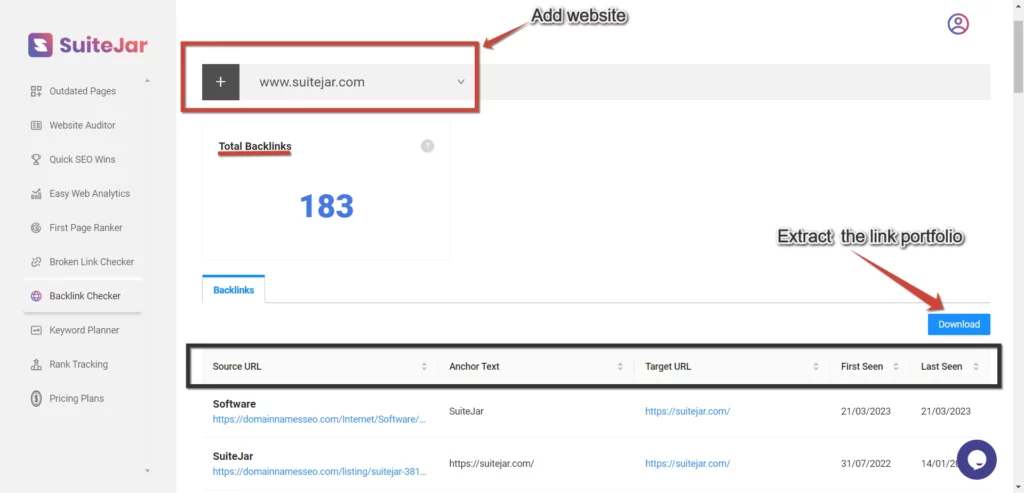
You enter the website link here and click enter. You will get the full details of the backlinks that you need for your seo.
Further Reading: What Is Off-Page SEO: The Complete Guide for 2024
7. Technical SEO
For small business seo strategy, technical seo helps to make the right difference for your website. You can ensure the right approach with limited marketing budgets. Every small business can easily increase its organic rankings and beat large companies that can get with the right technical seo strategies.
These are the essential technical SEO elements to prioritize for your small business.
- Site Speed: Optimize images, minimize HTTP requests, use asynchronous loading for CSS and JavaScript, leverage browser caching, and use a content delivery network (CDN).
- Secure Socket Layer (SSL): Change your website from HTTP to HTTPS to secure user data and improve trust and SEO.
- Duplicate Content: Use canonical tags to specify original content and ensure your CMS does not create multiple pages with identical content.
- XML Sitemap: Keep your XML sitemap updated and submit it to search engines via their webmaster tools.
- Robots.txt: Properly configure your robots.txt to direct search engine bots away from irrelevant or private sections of your site.
- Crawl Errors: Monitor and address crawl errors, such as 404 errors or server errors, using tools like Google Search Console.
- Hreflang Tags: Implement and test hreflang tags correctly for multilingual websites to target the appropriate regional audience.
Further Reading: The Ultimate Technical SEO Checklist You Will Ever Need
8. Quality Content Creation
For your website to receive increased traffic, you must create high-quality and relevant content. When you are creating content, the main idea is to find the targeted users to engage with it. It helps you make the customer your customer and build long-term engagement. Use a content marketing tool and craft the content that helps you in technical seo.
Add proper images and videos to make your content more engaging. Share this content with your target audience through social media to generate traffic.
- Keyword optimization: Perform keyword research that helps you write your content. You can incorporate these in your content with the right keywords in your title, headers, and all the paragraphs.
- Readability: Your webpage must contain clear and organized content, which makes it more readable. Many tools can help you check your content’s readability score.
- Content-Length: Create comprehensive posts that thoroughly cover topics, typically aiming for 1000 words or more for in-depth issues.
- Originality: Produce fresh content to avoid duplications and stand out from competitors.
- SEO Formatting: Properly formatted content helps search engines understand and rank your content higher. Use header tags (H1, H2, H3) effectively, include alt text for images, and ensure your paragraphs are SEO-friendly with appropriate keyword density.
A content marketing tool can help you create quality content for your website. SuiteJar, an SEO and content marketing tool, has two main features that help you develop your content marketing strategy.
a. First-page ranker

This feature thoroughly analyses your website content and identifies the website pages with the best possibility of ranking. You can integrate the tool with GSC and get all the insights into how you can improve the pages’ ranking in search results.
b. Outdated Page
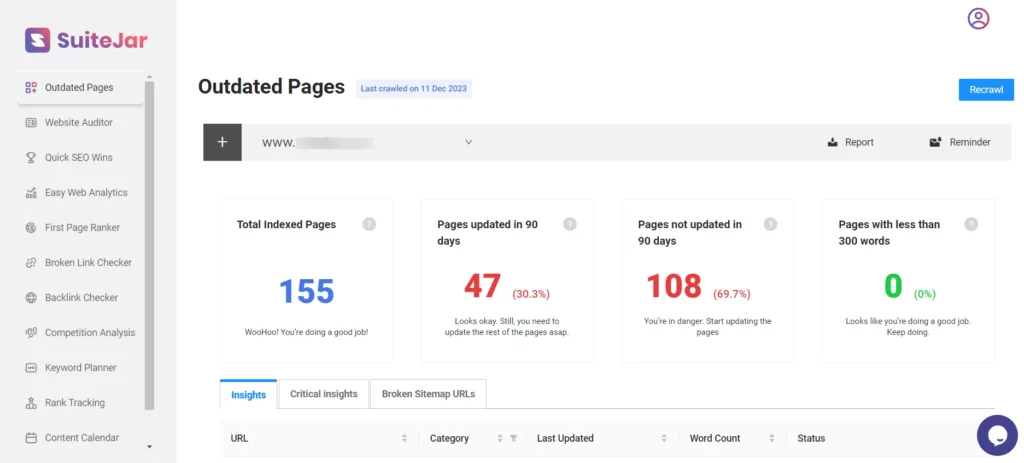
This solution provides clear insights into keeping your content up to date. It efficiently lists all the pages that need to be updated on your website, relieving you of the burden of manual checks. You can easily spot a page and update it according to the tool’s suggestions, ensuring your content remains fresh and relevant.
Further Reading: Complete Guide on Content Gap Analysis: Strategies & Tools
Conclusion
Implementing these ten simple SEO strategies can enhance your small business’s online presence in your industry. By focusing on your small business with an effective SEO strategy, you can attract more traffic and improve your search engine rankings. Start implementing these strategies with the appropriate SEO tool to boost your business’s success.
